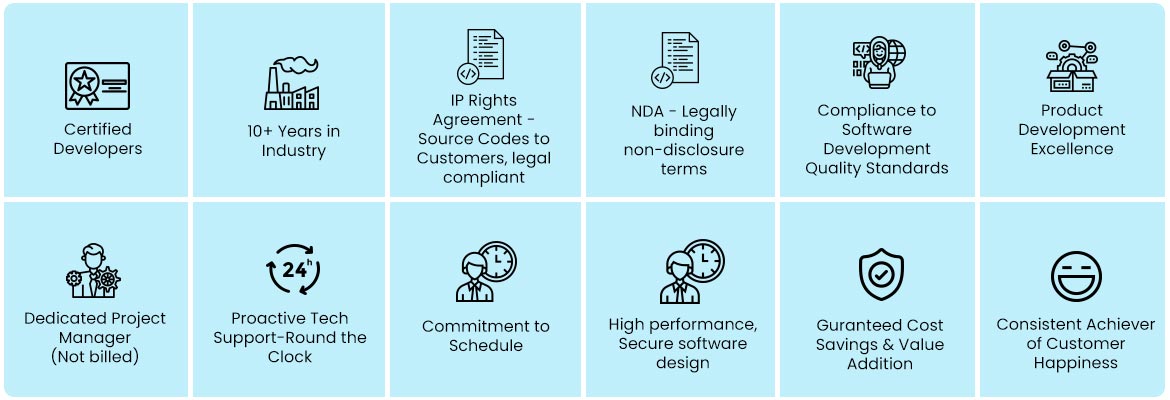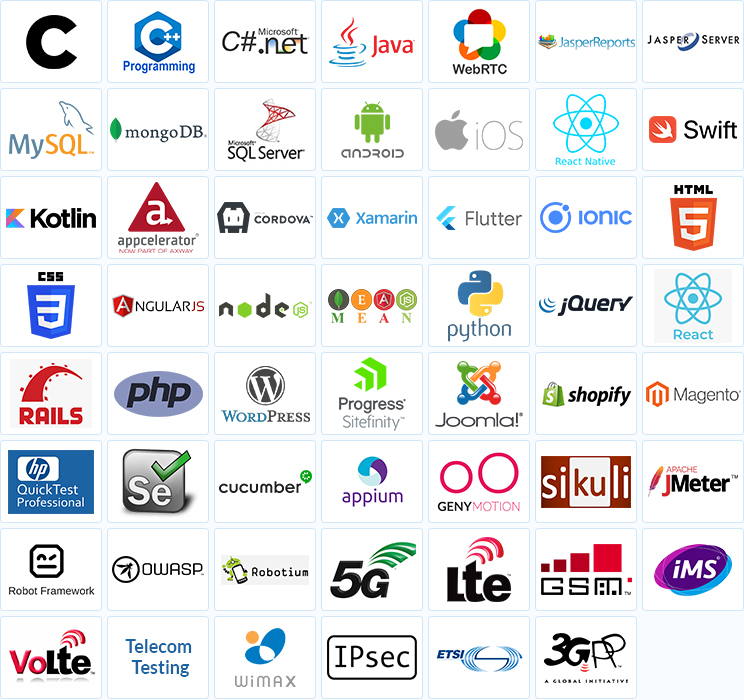React, Angular, and Node.JS are key players in the corporate world of web development, each with its unique significance and use cases. React and Angular are JavaScript libraries/frameworks, while Node.JS is a runtime environment for executing JavaScript on the server-side.
React and Angular are crucial for front-end development, with React focusing on building user interfaces efficiently, and Angular providing a comprehensive framework for creating robust web applications. React's virtual DOM and component-based architecture make it an excellent choice for building interactive and responsive user interfaces. Angular, on the other hand, offers a full-fledged framework that streamlines development through features like two-way data binding and dependency injection. The choice between React JS vs Angular JS often depends on project requirements and development preferences.
Node.JS is a powerhouse for back-end development, enabling the development of scalable and high-performance server-side applications using JavaScript. Its event-driven, non-blocking I/O architecture allows for efficient handling of concurrent connections, making it particularly valuable in corporate settings where real-time applications and microservices are prevalent. When considering React vs Node vs Angular in the corporate world, it's essential to recognize that they often work in harmony, with Node.JS serving as a common back-end for both React and Angular applications, creating a seamless full-stack development environment.
React JS, Node JS or Angular JS: A brief overview
Before getting into the nitty-gritty of React JS vs Node JS vs Angular JS, let’s get a better understanding on what these frameworks are-1. React JS
React.JS, often simply referred to as React, is an open-source JavaScript library for building user interfaces. It's a powerful tool for front-end web development that allows developers to create interactive and dynamic web applications with ease. What makes React unique is its component-based architecture, which breaks down the user interface into reusable, self-contained building blocks. This approach makes it efficient to develop and maintain complex applications. React also employs a virtual DOM, optimizing performance by updating only the parts of a webpage that change, rather than the entire page. It's widely used in the development of modern web applications, offering a responsive and seamless user experience.2. Angular JS
Angular JS, often referred to as Angular 1, is an open-source JavaScript framework developed by Google. It's designed to simplify and enhance web application development. Angular JS offers a structured approach to building dynamic, single-page web applications. It's characterized by two-way data binding, a powerful templating system, and a modular architecture that promotes reusability. With Angular JS, developers can create responsive, interactive web applications with ease, as it handles much of the heavy lifting for you. Although it's been largely succeeded by Angular (often referred to as Angular 2+), Angular JS still has its place in certain legacy projects and serves as a foundation for understanding the principles of modern web development with the Angular family of frameworks.3. Node JS
Node.JS is a versatile and open-source runtime environment that allows developers to run JavaScript on the server-side. It's a game-changer in web development because it enables non-blocking, event-driven architecture, making applications highly efficient and scalable. Node.JS is well-suited for real-time applications, APIs, and microservices, making it a popular choice in modern web development. It's particularly valuable for handling a large number of concurrent connections, which is crucial for today's data-intensive and interactive web applications. In a nutshell, Node.JS empowers developers to build fast, responsive, and high-performance server-side applications using the familiar JavaScript language.A balanced Face-off: React JS vs Node JS vs Angular JS
Now that we have a brief understanding on these frameworks, let’s get into the showdown: React JS vs Node JS vs angular.React.JS:
1.User Interface Library: React.JS, often referred to as React, is primarily a JavaScript library for building user interfaces. It focuses on the view layer of web applications.2.Component-Based Architecture: React's core strength lies in its component-based architecture. Developers create reusable UI components, making it easier to manage and maintain complex user interfaces.
3.Virtual DOM: React uses a virtual Document Object Model (DOM) to efficiently update the real DOM. This minimizes the need for full page reloads and enhances performance.
4.One-Way Data Binding: React primarily enforces one-way data binding, which means that data flows in a unidirectional manner from parent components to child components, reducing potential data flow issues.
5.Community and Ecosystem: React has a massive and active community. It is well-supported by Facebook and Instagram and benefits from a rich ecosystem of third-party libraries and tools, including Redux for state management.
Node.JS:
1.Server-Side Runtime: Node.JS is a runtime environment that allows you to run JavaScript on the server-side. It is not a library or framework but provides a platform for executing JavaScript server-side code.2.Event-Driven and Non-Blocking I/O: Node.JS is known for its event-driven, non-blocking Input/Output (I/O) model. This architecture ensures efficient handling of concurrent connections and I/O operations, making it ideal for building scalable, real-time applications and APIs.
3.NPM (Node Package Manager): Node.JS has a vast ecosystem of packages and modules accessible through NPM. It simplifies the process of integrating third-party libraries and dependencies into your server-side applications.
4.Scalability: Node.JS is highly scalable and can efficiently manage a large number of concurrent connections, making it a preferred choice for applications that require high performance, such as chat applications or streaming services.
5.Learning Curve: Learning Node.JS may require a good understanding of JavaScript and asynchronous programming concepts, but its simplicity and versatility have attracted many developers.
Angular.JS:
1.JavaScript Framework: Angular.JS, often referred to as Angular JS (distinct from the newer Angular 2+), is a JavaScript framework designed for building dynamic web applications, particularly single-page applications (SPAs).2.Two-Way Data Binding: Angular JS uses two-way data binding, which allows for automatic synchronization of data between the model and the view. When data changes in the model, it is immediately reflected in the view and vice versa.
3.Dependency Injection: Angular JS provides a robust system for dependency injection, making it easier to manage and test components within an application.
4.Complex Features: Angular JS offers a wide range of features, including built-in support for routing, form validation, and templating. This can make it an attractive choice for complex applications but may also result in a steeper learning curve.
5.Community Transition: It's essential to note that Angular JS (1.x) has been largely superseded by Angular (2+), which is a complete rewrite of the framework with enhanced features and better performance. Many developers have migrated to the newer Angular versions.
Question remains still: React JS vs Angular JS vs Node JS
In the grand showdown of React JS vs Angular JS vs Node.JS, we find a diverse landscape of web development tools, each with its unique strengths and applications. React.JS stands out as a powerful user interface library. It excels in creating dynamic and responsive user interfaces by employing a component-based architecture and a virtual DOM that optimizes performance. React's one-way data binding simplifies data management, making it an excellent choice for web applications where user experience is paramount. With a robust community and a plethora of third-party libraries, React continues to dominate the front-end development arena.On the other hand, Node.JS offers a different dimension, serving as a server-side runtime environment. Its event-driven, non-blocking I/O architecture makes it a top choice for building scalable and high-performance server-side applications. Node's ability to efficiently handle concurrent connections is invaluable in the corporate world, particularly for real-time applications and microservices.
Meanwhile, Angular JS (Angular 1) carves its niche as a full-featured JavaScript framework for creating dynamic web applications. With its two-way data binding, dependency injection, and a wide range of built-in features, it provides a structured approach to web development. However, it's important to note that Angular JS has been largely replaced by newer Angular versions, which have evolved to offer enhanced features and better performance.
Conclusion
In the React JS vs Angular JS battle, the choice depends on your project's requirements. React excels at building interactive user interfaces, while Angular JS (1.x) is suitable for complex applications. Node.JS, while distinct from React and Angular, often collaborates with both, acting as a powerful backend solution. In the corporate world of web development, these technologies often coexist, leveraging the strengths of each to create seamless, full-stack applications. Ultimately, the right choice comes down to project specifics and development team expertise, as the diverse landscape of web development tools provides the versatility to meet a broad array of needs.We at OdiTek engage in helping businesses navigate the dynamic landscape of web development technologies. With expertise across React, Angular, and Node.JS, we offer comprehensive services tailored to meet specific project requirements.
Contact us now!
What OdiTek offers

Refer our Skills page:

ReactJS Development
ReactJS development which is getting prevalent and most likely the trendiest JavaScript open source library these days. ReactJS is one of the accustomed JavaScript libraries which is widely known for its adjustability, extensibility,and convenience. Being the leading ReactJS Development Company in India, we totally admit...
more











